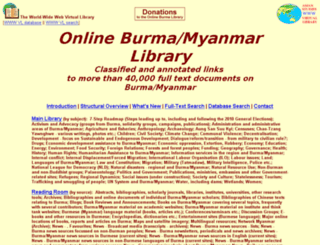Focal point
Location
The Online Burma/Myanmar Library (OBL) is a non-profit online research library mainly in English and Burmese serving academics, activists, diplomats, NGOs, CSOs, CBOs and other Burmese and international actors. It is also, of course, open to the general public. Though we provide lists of Burma/Myanmar news sources, the Library’s main content is not news but in-depth articles, reports, laws, videos and links to other websites, We provide a search engine (database and full text) and an alphabetical list of categories and sub-categories, but the Library is best accessed through browsing the 100 or so categories which lead to sub- and sub-sub categories. These tools should be used in combination.
Members:
Resources
Displaying 671 - 675 of 1151Displacement and disease: the Shan exodus and infectious disease implications for Thailand
Abstract:
"Decades of neglect and abuses by the Burmese government have decimated the health of the
peoples of Burma, particularly along her eastern frontiers, overwhelmingly populated by
ethnic minorities such as the Shan. Vast areas of traditional Shan homelands have been
systematically depopulated by the Burmese military regime as part of its counter-insurgency
policy, which also employs widespread abuses of civilians by Burmese soldiers, including
rape, torture, and extrajudicial executions. These abuses, coupled with Burmese government
Living Ghosts - The spiraling repression of the Karenni population under the Burmese military junta
Executive Summary: "The people of Karenni State are living ghosts. Their daily survival is an
achievement; however, it also signifies their further descent into poverty and a
spiralling system of repression. Whilst this report documents the deteriorating
situation in Karenni State over the past six years, this is nothing new for the
ethnically diverse population of this geographically small area. They have been
living in a protracted conflict zone for over 50 years with no respite from decades
Living Ghosts - The spiraling repression of the Karenni population under the Burmese military junta
Executive Summary: "The people of Karenni State are living ghosts. Their daily survival is an
achievement; however, it also signifies their further descent into poverty and a
spiralling system of repression. Whilst this report documents the deteriorating
situation in Karenni State over the past six years, this is nothing new for the
ethnically diverse population of this geographically small area. They have been
living in a protracted conflict zone for over 50 years with no respite from decades
Trends of Development of Myanmar Fisheries: With References to Japanese Experiences
Judging by the increase in landing volume, Myanmar fisheries is developing fast. Due to
the amount of export earning fisheries sector have its role as one of the main contributors to
the national GDP. Thus fisheries are recognized as an important economic sector for the
country. The fisheries landing is significantly increasing in recent years. It is more than three
times larger than that of 1990s.
In 1990-91 the earning form fisheries export was only US$ 13 million. It has been
Arbitrary Confiscation of Farmers’ Land by the State Peace and Development Council (SPDC) Military Regime in Burma
Abstract"
"This research was framed by a human rights approach to development as pursued by Amartya
Sen. Freedoms are not only the primary ends of development but they are the principle means of
development. The research was informed by international obligations to human rights and was placed
within a context of global pluralism and recognition of universal human dignity. The first research aim
was to study the State Peace and Development Council military regime confiscation of land and labour of


